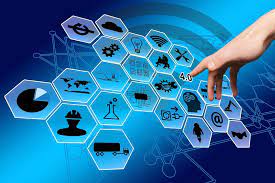
Exploring the Impact of Technology Today on Society
Technology Today: Shaping the Future
In the fast-paced world of today, technology is at the forefront of innovation and progress. From artificial intelligence to blockchain, technological advancements are transforming every aspect of our lives, making things more efficient, accessible, and interconnected.
The Rise of Artificial Intelligence
Artificial Intelligence (AI) has moved from being a concept in science fiction to a tangible reality that impacts various industries. AI algorithms are now used in healthcare for diagnosing diseases, in finance for detecting fraudulent activities, and in customer service through chatbots. The ability of AI to analyze vast amounts of data quickly and accurately is revolutionizing how we approach problem-solving and decision-making.
The Impact of Blockchain Technology
Blockchain technology has gained significant attention due to its potential to disrupt traditional financial systems. Originally developed as the underlying technology for cryptocurrencies like Bitcoin, blockchain offers a decentralized way to record transactions securely. Beyond finance, blockchain is being explored for use in supply chain management, voting systems, and intellectual property rights management.
The Internet of Things (IoT)
The Internet of Things (IoT) refers to the interconnected network of devices that communicate with each other via the internet. Smart homes equipped with IoT devices like thermostats, security cameras, and refrigerators are becoming increasingly common. In industries such as manufacturing and agriculture, IoT devices help monitor processes in real-time, leading to increased efficiency and reduced costs.
Advancements in Communication
Communication technology has seen remarkable advancements with the rollout of 5G networks. These networks promise faster internet speeds, lower latency, and greater connectivity. This will enable new applications such as augmented reality (AR), virtual reality (VR), and autonomous vehicles to function more effectively.
The Role of Big Data
Big Data analytics involves examining large datasets to uncover hidden patterns, correlations, and insights. Businesses leverage Big Data to understand consumer behavior better, optimize operations, and create personalized marketing strategies. In healthcare, Big Data is used for predictive analytics to anticipate disease outbreaks or patient needs.
Challenges Ahead
Despite its many benefits, technology also poses challenges that need addressing. Issues related to privacy concerns, cybersecurity threats, and ethical considerations around AI are becoming increasingly prominent. Ensuring that technological advancements benefit society as a whole requires careful regulation and thoughtful implementation.
The Future Outlook
The future of technology holds endless possibilities. As innovations continue to emerge at a rapid pace, our world will likely become even more connected and efficient. Embracing these changes while addressing the accompanying challenges will be key to leveraging technology’s full potential.
Conclusion:
Technology today is an integral part of modern life that continues to evolve rapidly. From AI’s transformative capabilities to blockchain’s disruptive potential and IoT’s interconnectedness—each advancement brings new opportunities along with challenges that must be navigated carefully.
Understanding Modern Technology: Answers to Common Questions About AI, Blockchain, IoT, 5G, Big Data, and Cybersecurity
- What is artificial intelligence and how is it used today?
- How does blockchain technology work and what are its applications?
- What are the benefits of the Internet of Things (IoT) in daily life?
- How is 5G technology different from previous generations of mobile networks?
- What is Big Data and how is it being utilized in various industries?
- What are the main concerns regarding cybersecurity in the age of advanced technology?
What is artificial intelligence and how is it used today?
Artificial Intelligence (AI) refers to the simulation of human intelligence in machines that are programmed to think and learn like humans. Today, AI is used across various industries to enhance efficiency and decision-making processes. In healthcare, AI algorithms assist in diagnosing diseases and personalizing treatment plans. In finance, AI helps detect fraudulent transactions and manage risk. Customer service has been revolutionized with AI-driven chatbots that provide instant support. Additionally, AI powers recommendation systems on streaming platforms and e-commerce sites, tailoring content and product suggestions to individual preferences. The widespread application of AI continues to grow, driving innovation and transforming how we live and work.
How does blockchain technology work and what are its applications?
Blockchain technology operates as a decentralized digital ledger that securely records transactions across a network of computers. Each transaction is stored in a “block” that is linked to the previous one, forming a chain of blocks—hence the name blockchain. This structure ensures transparency, immutability, and security, as each block is cryptographically linked to the previous one, making it difficult to alter past transactions. The applications of blockchain technology extend beyond cryptocurrencies like Bitcoin and include use cases in supply chain management, smart contracts, identity verification, voting systems, and more. Its potential to revolutionize industries by providing transparent and tamper-proof record-keeping systems makes blockchain technology a promising tool for enhancing efficiency and trust in various sectors.
What are the benefits of the Internet of Things (IoT) in daily life?
The Internet of Things (IoT) offers a multitude of benefits in daily life, revolutionizing how we interact with our surroundings. One key advantage is the convenience it brings through interconnected devices that can communicate and automate tasks seamlessly. In smart homes, IoT devices enhance comfort and security by allowing remote control of appliances and surveillance systems. IoT also improves efficiency in areas such as healthcare, where wearable devices can monitor vital signs and provide real-time health data to both individuals and healthcare providers. Additionally, IoT enhances sustainability efforts by optimizing energy usage and resource management. Overall, the IoT’s integration into daily life streamlines processes, enhances productivity, and ultimately enriches our quality of living.
How is 5G technology different from previous generations of mobile networks?
5G technology represents a significant leap forward from previous generations of mobile networks in several key ways. One of the most notable differences is the speed and bandwidth that 5G offers, providing significantly faster data transfer rates compared to 4G LTE. This increased speed enables quicker downloads, smoother streaming, and lower latency for real-time applications. Additionally, 5G technology has the potential to support a massive number of connected devices simultaneously, making it ideal for the growing Internet of Things (IoT) ecosystem. The deployment of 5G networks also promises improved network reliability and coverage, paving the way for innovative technologies like autonomous vehicles, augmented reality (AR), and virtual reality (VR) to flourish.
What is Big Data and how is it being utilized in various industries?
Big Data refers to the vast volume of structured and unstructured data that inundates organizations on a day-to-day basis. This data is characterized by its high volume, velocity, and variety, making it challenging to manage and analyze using traditional methods. In various industries, Big Data is being utilized to extract valuable insights, improve decision-making processes, enhance operational efficiency, and drive innovation. For example, in healthcare, Big Data analytics can be used to predict disease outbreaks and personalize patient care. In retail, it helps identify trends and customer preferences for targeted marketing strategies. Financial institutions use Big Data for fraud detection and risk management. Overall, the utilization of Big Data across industries is transforming how businesses operate and enabling them to stay competitive in today’s data-driven world.
What are the main concerns regarding cybersecurity in the age of advanced technology?
In the age of advanced technology, cybersecurity has emerged as a critical concern due to the increasing interconnectedness of devices and systems. One of the main concerns regarding cybersecurity is the rise of sophisticated cyber threats, such as ransomware attacks, data breaches, and phishing scams, which can compromise sensitive information and disrupt operations. Additionally, the growing reliance on cloud services and IoT devices has expanded the attack surface for cybercriminals, making it challenging to safeguard data and networks effectively. Ensuring robust cybersecurity measures, including encryption protocols, multi-factor authentication, and regular security updates, is essential to mitigate risks and protect against potential cyber threats in today’s technologically driven landscape.



